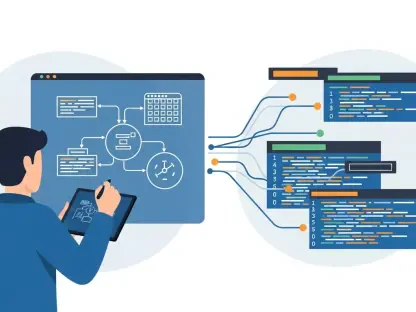North Carolina is taking significant strides in preparing its students for a tech-centric future. The state recently allocated $800,000 in grants to 18 school districts, an initiative aimed at supercharging computer science skills through coding. Launched in 2017, the Coding and Mobile App Development Grant program is designed to provide middle and high school students with essential tools and knowledge for thriving in technology-driven fields. Collaboratively supported by the North Carolina General Assembly and local businesses, the initiative signifies the state’s commitment to cultivating a generation adept in the digital world.
Strategic Grant Distribution and Utilization
Funding Allocation and Focus
The program awarded grants ranging between $13,000 and $80,000 to different school districts, with Wayne County Public Schools receiving one of the largest grants at $80,000. These funds are designated for purchasing equipment, obtaining digital materials, and covering costs associated with teacher professional development. The overarching goal is to fortify educational institutions’ capacity in coding, computer science, and mobile app development. For instance, the funds can be used to buy high-quality computers, advanced coding platforms, and other technological tools that can enhance students’ learning experiences.
By investing in these resources, North Carolina aims to ensure that its educational institutions are well-equipped to provide comprehensive computer science education. The grants also facilitate access to cutting-edge digital materials, which can offer students a broader perspective on coding and mobile app development. Furthermore, the program allocates a portion of the funds to professional development for teachers, ensuring they are adept at navigating and teaching the new K-12 Computer Science Standards. This holistic approach aims to create an environment where students have both the tools and the guidance necessary to excel in tech-related fields.
Professional Development and Curriculum Integration
A significant portion of the grant money is dedicated to teacher training, emphasizing the state’s commitment to a sustainable and effective educational model. Effective teaching requires educators to be well-versed in the new K-12 Computer Science Standards, adopted in 2023. Professional development workshops and training sessions are critical in equipping teachers with the skills needed to deliver comprehensive and engaging computer science lessons. These professional development initiatives not only focus on coding but also on valuable teaching methodologies that can help foster a more engaging and interactive classroom environment.
To underline the importance of early exposure to tech skills, starting in the 2024-2025 school year, ninth graders will be required to complete a computer science course before graduating. This mandate ensures that all students entering high school gain essential skills that are increasingly relevant in various professional fields. The move aims to embed computer science education into the state’s curriculum, making it a core subject alongside traditional subjects like mathematics and science. Through this comprehensive effort, North Carolina aims to cultivate a generation well-prepared for the demands of the modern, tech-driven workforce.
Strategic Implementation and Industry Partnerships
Long-Term Vision for Career Readiness
State Superintendent of Public Instruction Catherine Truitt emphasizes the importance of aligning K-12 education with industry needs. The rapid growth of technology-related jobs, especially those involving artificial intelligence, necessitates an early foundation in relevant skills. This alignment aims to ensure students are aware of high-wage, in-demand roles and possess the skills required for such careers. By preparing students early, the educational system can produce graduates who are not only knowledgeable but also capable of immediately contributing to the workforce.
Moreover, this initiative underscores the state’s proactive stance on education reform. By embedding computer science into the curriculum and ensuring professional development for teachers, North Carolina is paving the way for a new educational paradigm. This will ultimately help to reduce the skills gap and make students more competitive in the global job market. The long-term vision is clear: to align the state’s educational outcomes with the evolving demands of the workforce and to equip students with the knowledge and skills necessary for success in a technology-driven economy.
Collaboration with Local Businesses
The strategic partnerships forged with organizations such as VEX Robotics, TechSmart, STEM West, The Dot Consulting, Carolina Ballers, NASCAR, and Code.org enhance the real-world applicability of classroom lessons. These collaborations provide resources and unique industry insights, offering students a more dynamic and practical learning experience. For instance, partnerships with companies like VEX Robotics can give students hands-on experience with robotics, while organizations like Code.org can offer valuable coding curricula and resources.
Such alliances are pivotal in bridging the gap between academic knowledge and industry demands. By collaborating with businesses, the program ensures that the skills taught in classrooms are aligned with the requirements of the job market. These partnerships also provide students with opportunities for internships, mentorships, and real-world problem-solving experiences, further enhancing their readiness for tech careers. Additionally, these collaborations can foster a culture of innovation within schools, encouraging students to think creatively and develop solutions to real-world challenges.
Impact of the Grant Program on Education
Expanding Educational Reach
This year’s grant recipients are continuing or expanding programs initiated with previous funding rounds. The grants enable the addition of new coding and mobile app development courses, providing students with more opportunities to engage in these fields. Moreover, work-based learning opportunities allow students to experience tech-related work environments, bridging classroom learning with real-world applications. Already, the initiative has impacted over 10,000 students, teachers, administrators, and staff members statewide during the 2023-24 school year.
The expansion of educational programs is crucial for maintaining the momentum gained from previous grants. As more students participate in these programs, the impact on the state’s educational landscape will become increasingly significant. The grants also support the development of extracurricular activities, such as coding clubs and hackathons, which can further enhance students’ interest and proficiency in computer science. By providing diverse learning opportunities, the program aims to create an inclusive environment where all students can explore and excel in tech-related fields.
Mandatory Computer Science Course Requirement
From the 2024-2025 academic year, all ninth-grade students will have to complete a computer science course before graduation. This new requirement signifies a structural shift in education, underpinning the state’s commitment to embedding these essential skills early in students’ academic journeys. By making computer science education compulsory, North Carolina aims to create a tech-savvy workforce ready to meet future market demands. The mandatory course ensures that all students, regardless of their future career paths, have a foundational understanding of computer science.
This structural change in the curriculum is expected to have a profound impact on students’ readiness for the digital age. The requirement not only prepares students for careers in technology but also equips them with critical thinking and problem-solving skills applicable across various fields. Moreover, this initiative aligns with broader educational trends that emphasize the importance of STEM (Science, Technology, Engineering, and Mathematics) education. By prioritizing computer science, North Carolina is taking a significant step towards creating a future-ready generation capable of navigating and thriving in an increasingly digital world.
Future Prospects and Educational Reforms
Preparing for Technological Advancements
The program reflects North Carolina’s foresight in preparing students for a world where technology plays a central role. As the demand for tech-savvy professionals increases, early education in computer science becomes crucial. This proactive approach aims to ensure that students possess the skills necessary for future technological advancements and can thus contribute meaningfully to the economy and society. The program’s focus on early education also helps to identify and nurture talent from a young age, creating a pipeline of skilled professionals ready to enter the workforce.
Moreover, the initiative is part of a broader strategy to position North Carolina as a leader in tech education. By investing in cutting-edge educational resources and fostering strong industry partnerships, the state is setting a benchmark for other regions to follow. The focus on continuous improvement and adaptation to technological trends will help sustain this momentum. As technology continues to evolve, the state’s commitment to education reform will be crucial in ensuring that its students remain at the forefront of innovation and development.
Sustaining Educational Growth
North Carolina is making notable progress in equipping its students for a future dominated by technology. The state recently disbursed $800,000 in grants to 18 school districts with the goal of enhancing computer science skills through coding programs. This funding is part of the Coding and Mobile App Development Grant program, which was initiated in 2017. The program is designed to give middle and high school students the necessary tools and knowledge to excel in technology-driven careers. Supported by a collaboration between the North Carolina General Assembly and local businesses, this initiative underscores the state’s dedication to nurturing a digitally-savvy generation.
The focus is not merely on coding, but on a comprehensive approach to computer science education that prepares students for a wide range of tech-related fields. By integrating this curriculum into schools, North Carolina aims to create a strong foundation for students to build upon as they progress in their education and careers. This public-private partnership reflects a broader strategy to ensure that the state’s workforce remains competitive and adept in an increasingly digital economy.









